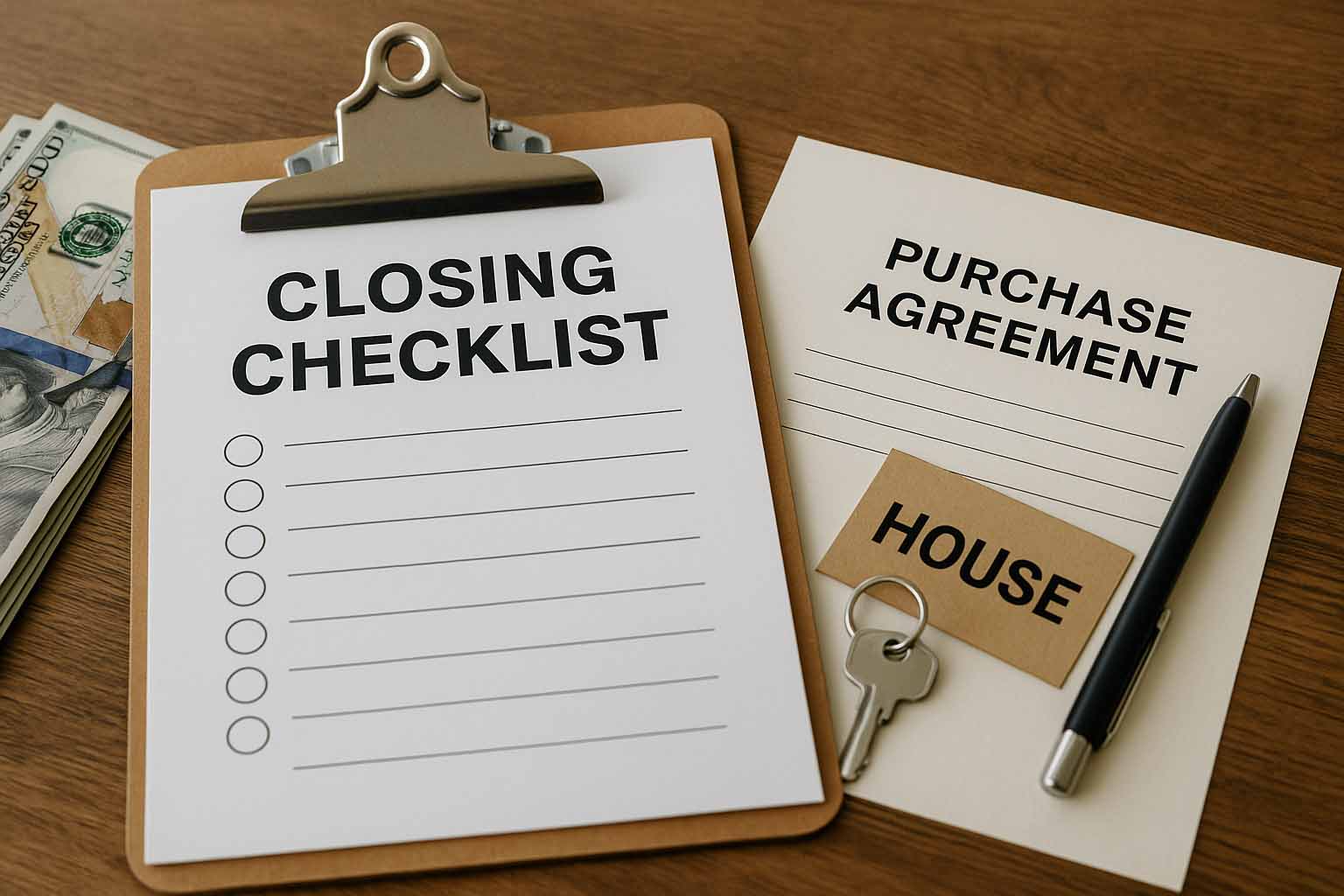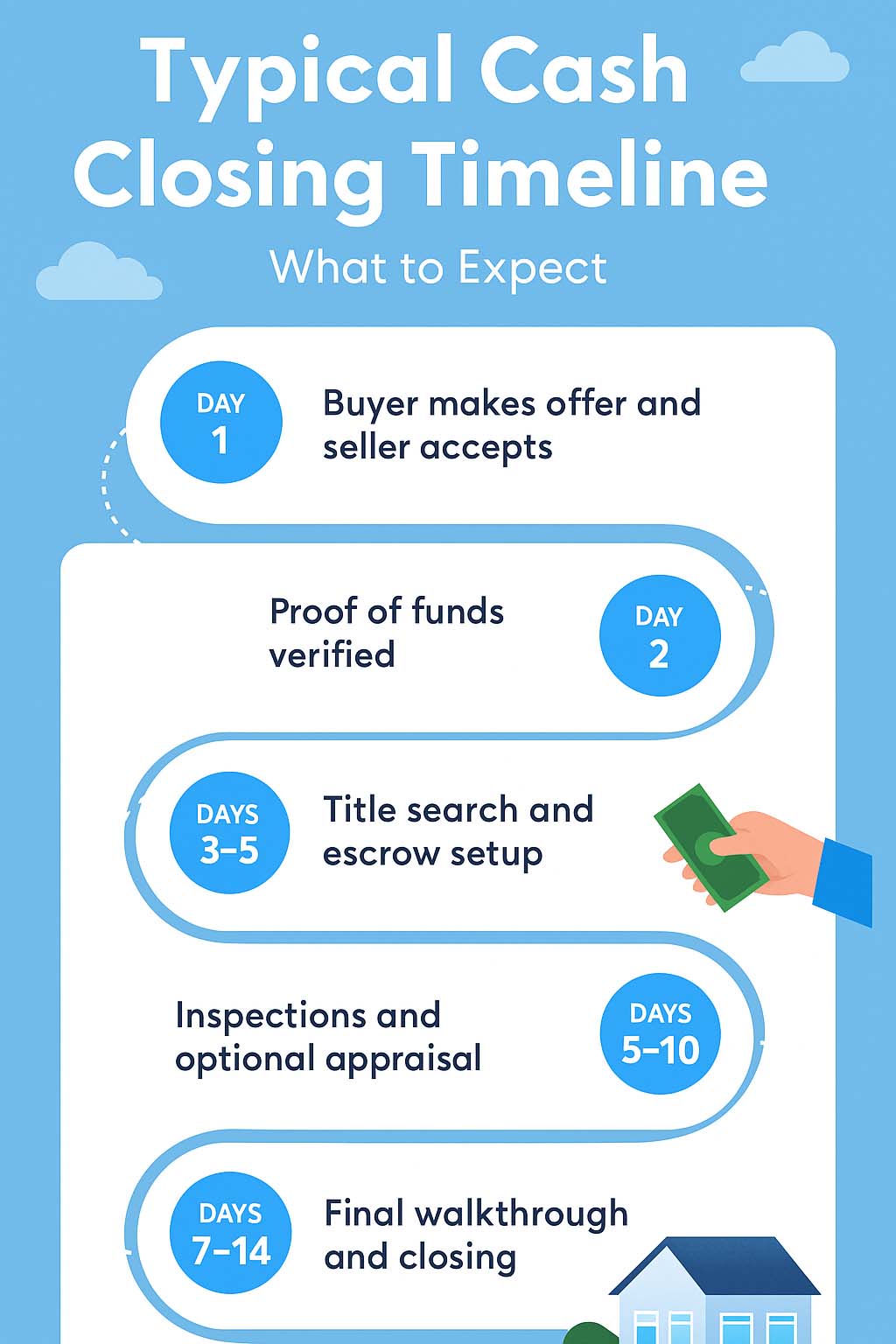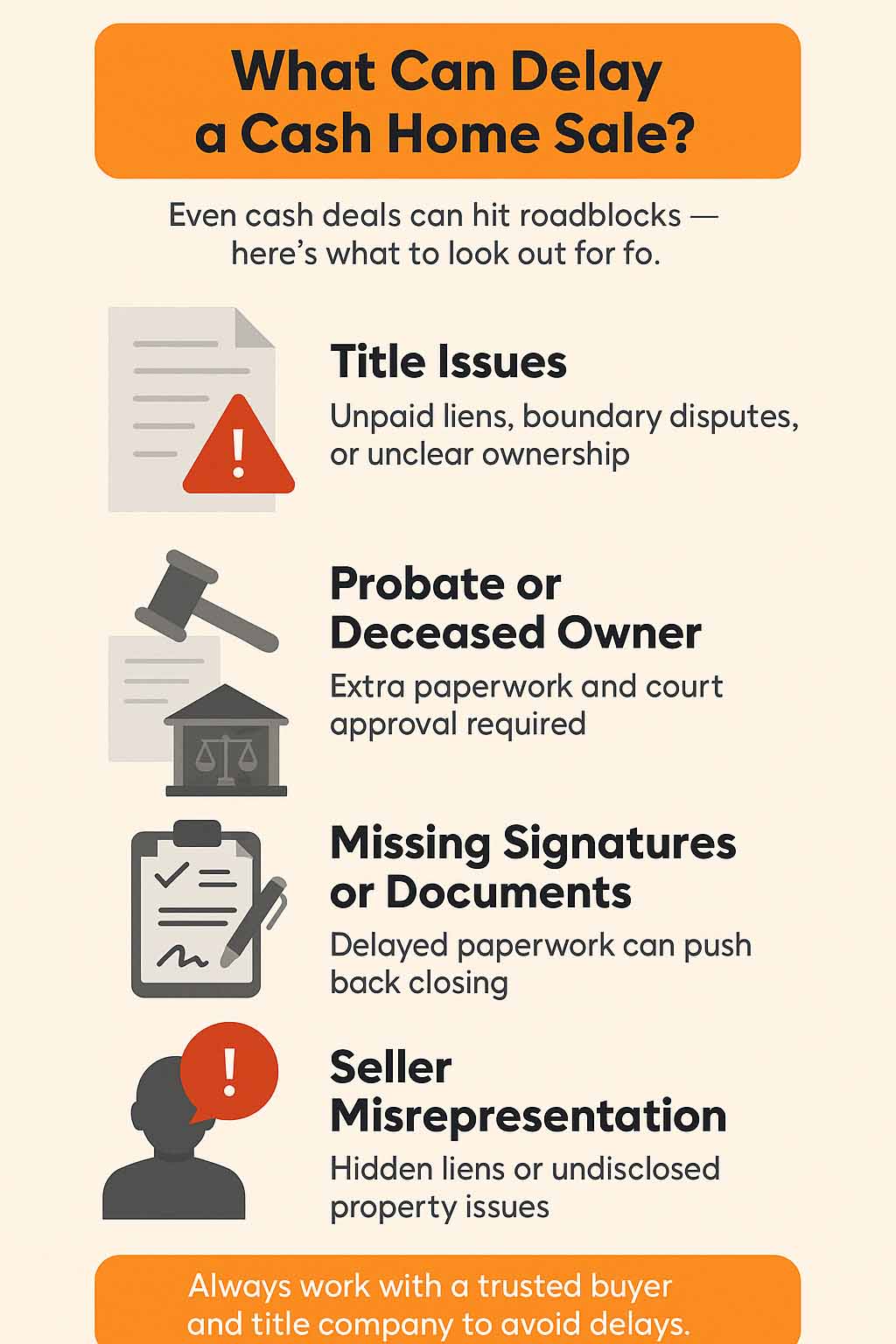Closing on a house with cash can take as little as 7 to 14 days, depending on how quickly the buyer and seller complete key steps, such as title work, inspections, and paperwork. In some cases, deals close in under a week. Compared to traditional mortgage closings, which often take 30 to 45 days, a cash sale is significantly faster and more predictable.
If you’re selling a home for cash, you have more control over the timeline. There’s no waiting on lender approvals, no last-minute financing surprises, and fewer hoops to jump through. It’s one of the simplest ways to close quickly and move forward on your terms.
Why Cash Sales Close Faster Than Traditional Deals
When there’s no mortgage involved, the process becomes much simpler for everyone. Here’s why cash deals move so much faster:
- No loan approvals or underwriting delays.
Buyers don’t need to wait weeks for a lender to approve financing, request documents, or order an appraisal. - Fewer contingencies.
Cash offers often come with fewer conditions, which means fewer chances for delays or negotiations to stall the deal. - Less paperwork to process.
Without a lender in the mix, there are fewer forms to sign and fewer regulations to follow, which speeds up closing timelines. - Faster title and escrow coordination.
Title companies can often wrap up cash deals in just a few days, especially if there are no liens or ownership issues.
If you’re a homeowner trying to sell quickly — whether due to relocation, financial stress, or a time-sensitive situation — a cash sale keeps things straightforward. It also reduces the chance of your deal falling through at the last minute.
Typical Cash Closing Timeline: What to Expect
Every real estate deal is a little different, but most cash closings follow a transparent and fast-moving process. Here’s a typical timeline for when both parties are ready and responsive:
- Day 1: Offer and Seller Acceptance
A cash buyer submits an offer. If both sides agree on price and terms, the seller accepts — often within 24 to 48 hours. - Day 2–3: Proof of Funds Verified
The buyer provides documentation showing that they have the necessary funds. This can usually be confirmed within one business day. - Day 3–5: Title Search and Escrow Setup
A title company is brought in to verify legal ownership and ensure the home has no liens or unresolved claims. Escrow is also open at this stage. - Day 5–10: Inspections and Optional Appraisal
Most buyers still want a home inspection, even with a cash deal. While an appraisal isn’t required, some buyers choose to get one. These steps can overlap or be waived for speed. - Day 7–14: Final Walkthrough and Closing
Once everything checks out, the buyer completes a final walkthrough. Both sides sign the paperwork, and funds are transferred — usually within two weeks from the offer date.
Many cash sales close in 7 to 10 days, and even quicker closings are possible if the property has a clean title and both sides are ready.
Key Steps in a Cash Home Purchase
Buying a home with cash skips the financing process, but it still involves several essential steps. It starts with negotiating the deal. Both the buyer and seller must agree on the price, closing date, and any conditions of the sale. This part can move quickly if both sides are motivated and prepared.
Once the offer is accepted, the buyer must provide proof of funds. This is typically a simple document from a bank or financial institution confirming that they have sufficient funds available to complete the purchase. It’s a crucial step that gives the seller confidence and allows the process to move forward.
The next step is to open escrow and work with a title company. The title company verifies the property’s legal status and ensures that there are no outstanding issues, such as unpaid taxes, liens, or disputes over ownership. During this time, the buyer sends in their earnest money deposit, indicating their seriousness about the purchase.
Even in cash sales, most buyers still choose to schedule a home inspection. It’s the best way to understand the property’s condition before finalizing the deal. Some buyers may also order an appraisal, though it’s optional when no lender is involved.
Finally, the buyer walks through the property one last time to confirm everything is in the expected condition. If no issues arise, the closing occurs shortly after. The paperwork is signed, funds are transferred, and ownership changes hands.
How Long Does a Cash Sale Take?
In the best-case scenario, a cash sale can close in just five to seven days. This typically occurs when the property has a clear title, no major repairs are required, and both parties are eager to proceed quickly. Experienced investors and cash buyers often work with trusted escrow partners who can expedite the process even further.
More commonly, cash transactions take about seven to fourteen days. This allows time for standard steps, such as title searches, inspections, and document preparation. It also gives the seller time to vacate the property if they’re still living there. If the home is vacant and everything aligns, the timeline can be shortened.
Some cash deals take three to four weeks to complete. This is more likely to occur when issues arise, such as title problems, delays in document collection, or additional negotiations between the buyer and seller. While still faster than most financed deals, these situations can extend the timeline slightly.
For homeowners in a hurry to sell, a cash offer often means more certainty and less waiting. The ability to close quickly is one of the most significant advantages of accepting a cash deal.
What Can Delay a Cash Closing?
Although cash sales are typically faster, specific issues can still cause delays. One of the most common causes is a problem with the title. If there are unpaid liens, unresolved ownership questions, or outstanding mortgages that haven’t been cleared, the title company must resolve these issues before the sale can proceed. Depending on the complexity, that can take several days or even weeks.
Another delay can happen when a deceased person is still listed on the title. If the property is still tied up in probate or if heirs haven’t reached an agreement, those legal matters may need to be addressed before the sale can proceed. It’s best to consult a probate attorney for guidance in these cases. This often requires extra documentation, court approval, or legal verification.
Sellers going through bankruptcy can also create delays. If the seller is in bankruptcy, court involvement is often required before the sale can move forward. Each case is different, so legal counsel is essential in these situations.
Sometimes delays happen simply because a seller hasn’t disclosed important details upfront. If there are additional liens, unpaid taxes, or another person with ownership interest, those issues can surface late in the process. Being transparent from the beginning can help avoid surprises later on. It’s wise to work with a title and escrow team familiar with your local requirements to ensure a smooth process.
Benefits of Buying or Selling With Cash
Whether you’re a homeowner looking to sell quickly or a buyer seeking simplicity, closing with cash offers clear advantages, here’s why more people are choosing this route — and how it makes the process easier on both sides.
1. Faster Closing Timeline
Cash deals typically close in 7 to 14 days, while mortgage-backed sales often take 30 to 45 days. Without the need for loan approvals, underwriting, or lender-required appraisals, everything proceeds more quickly. This speed is ideal for sellers facing:
- Job relocation
- Foreclosure timelines
- Divorce or probate sales
- Major repairs they want to avoid
2. Lower Risk of Deal Falling Through
Financing is the most common reason real estate deals fail to close. When buyers pay cash, there’s no chance of:
- Loan denial at the last minute
- Missed lender deadlines
- Underwriting issues
- Last-minute rate changes affecting approvals
With funds already in hand, cash buyers can follow through — making the deal more reliable for sellers.
3. Fewer Costs and Fees
Both buyers and sellers can save thousands by avoiding standard lender-related fees. Cash transactions eliminate:
- Loan origination fees
- Mortgage insurance premiums
- Lender-required inspections or appraisals
- Bank processing charges
Sellers also benefit from streamlined closings that may reduce title and escrow costs.
4. Stronger Negotiating Power
In competitive markets, cash offers stand out. Sellers often prefer cash buyers because:
- The offer is not contingent on financing
- The close date is flexible.
- The process is less stressful.l
This gives cash buyers an edge — they may win bids even when offering slightly less than a financed buyer.
5. Immediate Equity and Future Flexibility
Buyers who pay with cash own the home outright from the very beginning. This provides:
- Full equity to borrow against (HELOC or home equity loan)
- No interest payments over time
- Greater financial control and peace of mind
Owning a property free and clear opens more doors for future investment and stability.
6. Simplified Process With Fewer Hurdles
Cash sales involve less paperwork, fewer delays, and more direct communication. Without lender involvement, the transaction stays between the buyer, seller, and title company. That means:
- Fewer forms
- Fewer required inspections
- More privacy
- Less back-and-forth between multiple parties
For homeowners seeking a stress-free way to sell quickly or for buyers looking to avoid the red tape, a cash deal often makes the most sense.
Can You Close Faster With the Right Buyer?
The answer is yes — the right buyer can make all the difference in how quickly a cash sale closes. Not all cash buyers are the same. Some are experienced professionals who work closely with trusted title companies and know exactly how to expedite the process. Others may be first-time investors or individual buyers who require more time, request additional inspections, or delay because they’re unsure how to proceed.
Working with a seasoned cash buyer means fewer surprises and a more predictable closing timeline. They often waive unnecessary steps, such as appraisals or lengthy option periods, and are prepared to provide proof of funds upfront. These buyers are usually familiar with the title process, understand how to resolve minor issues quickly, and have established relationships with escrow agents who prioritize fast closings.
Some real estate investors also utilize their in-house teams to handle paperwork and communication, which further streamlines the process. If you’re a homeowner looking for a fast and simple sale, finding the right buyer — someone who is organized, transparent, and experienced — is just as crucial as getting the offer itself.
Ultimately, a well-prepared cash buyer can help you close in under 10 days, whereas the wrong buyer could prolong the process by weeks. If time is critical, ask questions before accepting the offer. Ensure the buyer has completed this step, has the necessary funds, and is willing to work within your timeline.
Ready to Sell Your House Fast?
If you’re ready to experience a fast, hassle-free home sale, contact 48Acquisitions today. Don’t delay – get cash for your house fast and move on to your next chapter with confidence.
Frequently Asked Questions About Cash Home Sales
How long does it take to close on a house when purchasing it with cash?
Most cash sales are closed within 7 to 14 days, although some can be finalized in as little as 5 days if all the necessary paperwork is in order. The timeline depends on how quickly the title is cleared, funds are verified, and both parties are ready to sign.
What slows down a cash home purchase?
Common delays include title issues, unresolved liens, probate complications, or missing documents. Honest communication between the buyer and seller, along with working with a reliable title company, keeps things on track.
Do you need an inspection if you’re buying with cash?
No, but it’s usually a brilliant idea. Cash buyers often include inspections “for informational purposes only,” meaning they won’t ask for repairs but still want to know the home’s condition.
Can you negotiate with a cash buyer?
Yes. Even though cash buyers offer speed and convenience, sellers can still negotiate the sale price, closing date, or other terms. Just because financing isn’t involved doesn’t mean you lose flexibility. Sellers can still negotiate important terms like price and timing.
Is it safe to sell a house for cash?
It can be very safe — especially when working with verified buyers and licensed title or escrow companies. Always confirm proof of funds, review the purchase agreement carefully, and don’t skip the title process.
Can a cash buyer back out of the deal?
Yes, just like any buyer. But if the offer is well-documented, with earnest money deposited and contingencies clearly defined, the risk is lower. Make sure everything is in writing and deadlines are firm.





